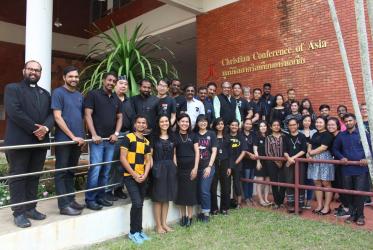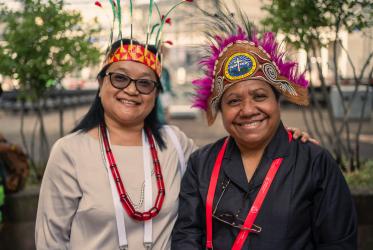“Nature is our home,” said Dr. Maria Sumire Conde from the Quecha community of Peru. She says some of those who have come there, however, have not been good guests.
In a 31 August hearing on “ecological debt” during the World Council of Churches Central Committee meetings in Geneva, Sumire and others shared some of the ways that the global South has frequently been victimized by greed and unfair use of its resources.
|
In the case of Peru, Sumire said mining has had particularly devastating effects: relocation, polluted water, illness and decreasing biodiversity. “We indigenous peoples propose that those responsible should take on the ecological debt and commit themselves to rectify the harm done over the years” to the earth and its people, she said. The concept of ecological debt has been shaped to measure the real cost that policies of expansion and globalization have had on developing nations, a debt that some say industrialized nations should repay. Dr Joan Martínez Alier, a professor at the Universitat Autónoma de Barcelona in Spain, said that debt includes both actual financial costs as well as intangibles such as quality of life. Martínez said climate change, unequal trade, “bio-piracy”, exports of toxic wastes and other factors have added to the imbalance, which he called “a kind of war against people around the world, a kind of aggression”. “I know these are strong words, but this is true,” he said. Martínez beseeched those present, at the very least, to not increase the existing ecological debt any further. Dr Ofelia Ortega of Cuba, the WCC president from Latin America, said it is a spiritual issue, not just a moral one. “The Bible is an ecological treatise” from beginning to end, Ortega said. She described care for creation as an “axis” that runs through the Word of God. “Our pastoral work in our churches must be radically ecological,” she said. Dr Kim Yong-Bock of the Advanced Institute for Integral Study of Life in South Korea also framed the issue in biblical language. “God has made comprehensive covenants with all living beings and with the earth as the living entity,” he said. “This covenant is broken.” |
|
Delegates at the central committee meetings are considering a statement on “eco-justice and ecological debt”. The proposed statement first came to the central committee in February 2008 and was subsequently circulated to member churches for ideas and suggestions. Delegates heard a first draft of the revised version on Monday and offered additional refinements. They are expected to take action on the statement later this week.
More information on the 26 August - 2 September 2009 Central Committee meeting







